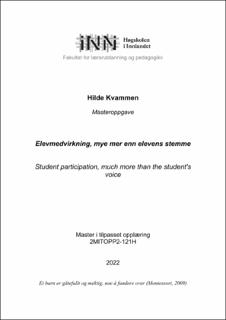Elevmedvirkning, mye mer enn elevens stemme
Master thesis
Permanent lenke
https://hdl.handle.net/11250/3032979Utgivelsesdato
2022Metadata
Vis full innførselSammendrag
Denne masteroppgaven i tilpasset opplæring omhandler elevmedvirkning i skolen. Tematikken er undersøkt i en skole hvor elevmedvirkning har en svært sentral rolle, Montessoripedagogikken. Fenomenet er undersøkt med følgende problemstilling: Hvordan erfares elevmedvirkning i Montessoripedagogikken, og på hvilken måte kan deres erfaringer sees i lys av selvbestemmelsesteorien? Fridtjof Sahlström (2014, s. 36) påpeker at det er lite forskning om elevenes læring der elevene er i sentrum. Og nettopp derfor anså jeg det som nyttig med flere studier rundt elevenes opplevelse av sin skolehverdag med medvirkning og autonomistøtte læringsmiljø i fokus. Formålet med oppgaven var å se medvirkning gjennom brukernes øyne, og løfte frem, samt drøfte deres erfaringer av medvirkning i det daglige arbeidet i skolehverdagen.
Problemstillingen har blitt undersøkt med en kvalitativ tilnærming, hvor ni elever i aldersgruppen 12-15år har blitt intervjuet. Datagrunnlaget baserer seg på deres uttalelser. Oppgaven er forankret i Deci og Ryans selvbestemmelsesteori, medvirkningsbegrepet i skolens kontekst og Montessoris filosofi og pedagogikk. På bakgrunn av analysens funn er det foretatt en abduktiv analyse. Elevenes erfaringer danner grunnlag for hvilke kategorier som drøftes, samt valg av store deler av teori og tidligere forskning. Kategoriene drøftes opp mot oppgavens teoretiske forankring som er konsentrert om problemstillingens hovedpilar; elevmedvirkning gjennom frihet og ansvar i Montessoripedagogikken.
Mine funn viser at elevmedvirkning i arbeid med fagene er svært viktig for deres motivasjon, tilpassede oppgaver og interessefelt. Likevel viser denne undersøkelsen til at både medelevers -og læreres relasjoner til den enkelte elev, har betydning for deres reelle medvirkning. Det vil si, denne undersøkelsen viser hvordan et dårlig læringsmiljø kan påvirke elevenes medvirkning i arbeid med fagene, på samme måte som deres relasjoner til venner og lærere er med på å styrke deres medvirkning. Elevene opplever også at lærerens engasjement i undervisning har betydning for om de ønsker å medvirke i skolehverdagen. Til tross for at både elevmedvirkning, Montessoripedagogikken og selvbestemmelsesteorien tar utgangspunkt i å forsterke elevenes indre motivasjon, viser denne undersøkelsen også til hvordan ytre motivasjon som karakterer, kan forsterke noen elevers indre motivasjon. This master's thesis in adapted education deals with student participation in school. The topic has been examined in a school where student participation has a very central role, the Montessori pedagogy. The phenomenon is investigated with the following problem: How is student participation experienced in the Montessori pedagogy, and in what way can their experiences be seen in the light of the self-determination theory? Fridtjof Sahlström (2014, p. 36) points out that there is little research into pupils' learning where pupils are at the centre. And that is precisely why I considered it useful to have more studies about the pupils' experience of their everyday school life with a focus on participation and autonomy-supportive learning environments. The purpose of the task was to see participation through the eyes of the users, and highlight, as well as discuss their experiences of participation in the daily work in everyday school life. The problem has been investigated with a qualitative approach, where nine pupils in the age group 12-15 years have been interviewed. The database is based on their statements. The assignment is rooted in Deci and Ryan's self-determination theory, the concept of participation in the school context and Montessori's philosophy and pedagogy. Based on the findings of the analysis, an abductive analysis has been carried out. The students' experiences form the basis for which categories are discussed, as well as the selection of large parts of theory and previous research. The categories are discussed against the thesis' theoretical grounding, which is concentrated on the problem's main pillar; student participation through freedom and responsibility in Montessori education.
My findings show that student participation in working with the subjects is very important for their motivation, adapted tasks and fields of interest. Nevertheless, this investigation shows that both fellow students' and teachers' relationships with the individual student are important for their real participation. In other words, this investigation shows how a poor learning environment can affect students' participation in work with the subjects, in the same way that their relationships with friends and teachers help to strengthen their participation. The pupils also experience that the teacher's involvement in teaching is important for whether they want to participate in everyday school life. Despite the fact that both student participation, Montessori pedagogy and self-determination theory are based on strengthening students' inner motivation, this research also shows how external motivation such as grades can strengthen some students' inner motivation.
